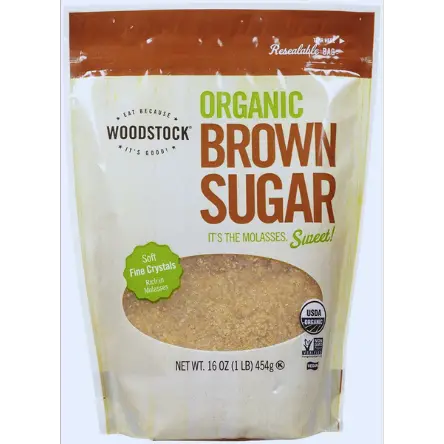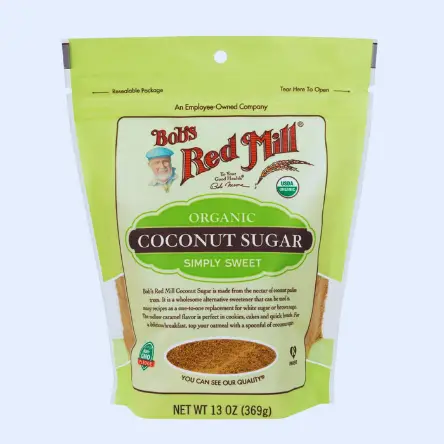Also known as palm sugar, gur, and jaggery, coconut sugar is a coarse dark sugar derived from the sap of various palm trees or sugarcane juice – not the coconuts.
Many vegans use coconut sugar as a popular sweetener as it is plant-based and minimally processed. Because coconut sugar is a plant-based, natural sweetener, it may be considered more nutritious than regular table sugar. However, coconut sugar is nearly the same as regular cane sugar in terms of nutrients and calories.
Contents
Substitution Options for Coconut Sugar
Other sugars are generally a bit sweeter than coconut sugar, so you may need to reduce the amount.
[1] Brown Sugar
= 2/3 cup of light or dark brown sugar can be used as a substitute for 1 cup of coconut sugar.
Brown sugar is a type of sugar that has been refined and then mixed with molasses. The molasses gives it its brown color and also increases its sweetness.
Brown sugar is typically made from sugar cane or sugar beets, which are processed into white sugar crystals. Then these crystals are moistened with molasses, which turns them brown.

[2] Sucanat
An unrefined, natural cane sugar made from minimally processed sugar cane juice, Sucanat (its name is an abbreviation for sucre de canne naturel, meaning “natural sugar cane”) has a deep molasses-like flavor and a tannish-brown color.
The coarse texture of sucanat makes it an excellent choice to use as the coarse granules to top baked goods.
Sucanat is a healthy, natural sweetener that is made from dried cane juice.
When you substitute Sucanat, you get a granulated form of sugarcane juice, which is dried and put into granules. It’s naturally sweet and contains all the nutrients found in sugarcane, including calcium, iron and potassium.
Sucanat has a low glycemic index (GI), which means it doesn’t cause your blood sugar levels to spike like regular sugar does. This makes it an excellent choice for people with diabetes or those who want to control their weight.
= 1 cup sucanat can be used to replace 1 cup coconut sugar.
[3] Honey
Use raw honey in a 1:4 ratio as coconut sugar when substituting.
= 1/4 cup honey is a replacement for 1 cup of coconut sugar.
*You may need to adjust other liquids in your recipes when using liquid substitutes.
Honey is the sweet, sticky substance that bees create when they gather nectar from flowers. The bees collect and store the nectar until it becomes honey, and then they spread the honey throughout their hive and use it to feed their young.
Honey is a great source of energy for humans because it contains carbohydrates, proteins, and minerals. It also contains antioxidants that fight free radicals in your body, which can cause damage to cells and lead to diseases such as cancer.
Some types of honey have medicinal properties as well. For example, Manuka honey has been found to be effective at treating wounds and burns on humans.
[4] Maple Syrup
Use maple syrup in a 1:4 ratio as coconut sugar when substituting.
= 1/4 cup of maple syrup is an exchange for every 1 cup of coconut sugar.
*You may need to adjust other liquids in your recipes when using liquid substitutes.
Maple syrup is a sweet syrup made from tapping the sap from maple trees. The sap is concentrated by boiling it down until it becomes a thick, sticky liquid.
There are two types of maple syrup: light and dark. The darkness of the syrup is dependent on how long the sap was boiled to concentrate it.
[5] Agave Syrup
Agave syrup is 1-1/2 times sweeter than sugar!
= 1/4 cup agave syrup is a substitute for 1 cup of coconut sugar needed.
*You may need to adjust other liquids in your recipes when using liquid substitutes.
Agave Syrup is a sweetener that is similar to honey. It is made from the sap of the agave plant, which is native to Mexico and has been used by indigenous people there for centuries. The sap is heated and filtered, then blended with other ingredients like fructose or glucose to create a sweetener with a mild taste that can be used in place of sugar in many recipes.
Agave syrup comes in two different grades: light and amber. Light agave syrup has a milder flavor than amber, but both are good options if you’re looking for a natural sweetener that doesn’t contain as much fructose as high-fructose corn syrup (HFCS).
How Coconut Sugar is Made
The blossom of the coconut palm produces the sap. Like date sugar, coconut sugar is minimally processed. Harvesters tap coconut palm sap by cutting into the tree’s flower-bud stem to access its nectar. It is mixed with water, boiled into a syrup, and allowed to dry, which creates the crystals. Afterward, the dried sap is broken apart to make sugar granules that resemble regular table or cane sugar.
Coconut sugar is not as fibrous as date sugar, but it does provide the sweetness and has notes of butterscotch that you would get from substituting date sugar. Coconut sugar crystals will melt, whereas non-crystallized date sugar does not dissolve completely. Use coconut sugar to replace date sugar in any application.
Coconut Sugar Nutrition Information
There are many nutrients in the coconut palm that remain in the sugar. Iron, zinc, calcium, and potassium can be found in sugar, but there is not enough in a sugar measure to support the body daily. Coconut sugar does contain the soluble fiber inulin, which is linked to a lower risk of blood sugar spikes.
Some studies show that coconut sugar could prevent low blood sugar by raising blood glucose levels to avoid hypoglycemia. Therefore, coconut sugar provides a few potential health benefits, but its use is primarily as a sweetener.
Hypoglycemia can make you feel hungry, shaky, sweaty, dizzy, or nauseous, and it can even lead to seizures and coma. Coconut sugar is a choice if you are looking for a natural, plant-based sweetener to keep your blood glucose and energy levels up. People with diabetes may opt to use coconut sugar to reduce post-meal blood sugar spikes.

FAQ
Is coconut sugar a good substitutes for diabetics?
According to the American Diabetes Association, coconut sugar has a low glycemic index but it contains the same amount of calories and carbs, therefore, it should be measured the same as regular sugar.
Some studies show that coconut sugar could prevent low blood sugar by raising blood glucose levels to avoid hypoglycemia. Coconut sugar does contain the soluble fiber inulin, which is linked to a lower risk of blood sugar spikes. Therefore, coconut sugar provides a few potential health benefits, but its use is primarily as a sweetener.